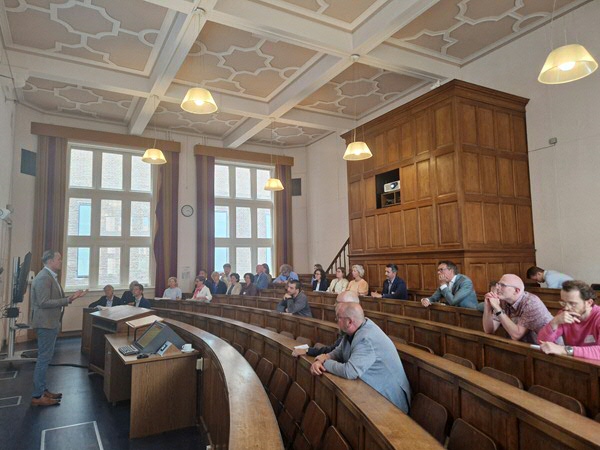‘Europe is high on the agenda of the University of Groningen’
European funding plays a crucial role for universities. How does the University of Groningen make use of European opportunities, and how do we align with the latest developments from Brussels? These questions were central during the working conference ‘EU Research & Innovation policy and funding’.
Key messages from the meeting
Latest developments in Brussels: more emphasis on high “technology readiness level” (TRL)
How to successfully apply for European funding? Right networks, making choices, using talents and the importance of developing a political antenna among researchers
Growing importance of European funding
Recently, European Commission President Ursula von der Leyen emphasized the importance of science. A positive message, according to Jouke de Vries, President of the Board of the University of Groningen, who opened the event on European funding with his speech. He added that this message is especially relevant given the turbulent geopolitical times. In addition to regional and national funds, European grants are becoming increasingly important, with a growing focus on impact. ‘Europe is high on the University of Groningen’s agenda,’ De Vries emphasized.
The University of Groningen (UG) aims to make an impact as a ‘fifth-generation university,’ the University President continued. Fourth-generation universities, such as the Dutch technical universities, engage in structural collaboration with the world around them. As a fifth-generation university, Groningen adds something new: as a comprehensive knowledge institution, the University of Groningen brings together all scientific disciplines to work jointly on the major challenges of our time.
Geert Jan Arends, Senior Advisor Research Funding, gave a brief reflection on Horizon Europe, the European Union's research and innovation programme. From 2020 to 2027, the EU will make almost 100 billion euros of funding available for innovation and research. The funds are distributed across three “pillars”, Arends explained. For the UG, European funds mainly stem from the first pillar, which is all about excellent research (e.g. via the ERC Grants and Marie Skłodowska-Curie Actions). The second and third pillars focus on societal challenges and innovation. For the second pillar in particular, Arends sees room for improvement for the UG.

Latest developments in Brussels
Martijn Röfekamp, EU Liaison Officer, anticipated key developments in Brussels. He referred to the Draghi report and the European Union's resulting Competitiveness Compass, which revolves around the question: how does Europe maintain its competitiveness compared to countries like China and the US, especially in terms of innovation? Von der Leyen calls for R&I (research and innovation) to become central to Europe's economic strategy.
This seems a positive development for universities, but Röfekamp argued that the emphasis is increasingly on advanced technology, rather than fundamental research. Brussels also wants to centralise the European funding pot. Universities risk losing autonomy. But, Röfekamp pointed out, the race is far from over. Recently, companies reminded Brussels policymakers of the importance of fundamental research. And Horizon Europe is likely to continue as an independent programme.
This summer, more clarity will emerge on the allocation of European funds. Universities have two possible options: try to exert influence in Brussels, as well as anticipate new developments. This is exactly what was central to the gathering: how do we turn new developments into opportunities for the university?
Successfully applying for European funding
Helga de Valk, director of the Netherlands Interdisciplinary Demographic Institute (NIDI), spoke about her extensive experience with European funding. According to De Valk, there are significant funding opportunities in Brussels, but a successful approach requires a tailor-made route. Researchers do well to make use of their talents. 'Not everyone is suited to write a research proposal for an ERC Grant,' the professor argued. And sometimes an application may come too early. She also stressed the importance of a strong network, something that takes time to establish. Relationships and trust are fundamental to a successful application, the NIDI director said.
Guest speaker Sean McCarthy, who has over 40 years of experience in European research funding, talked about preparing a European research strategy. He pointed to FP10, the 10th European framework programme for research and innovation that will succeed Horizon Europe from 2028 onwards. According to McCarthy, it is crucial to monitor how this new programme is being prepared, and this also goes for researchers. The scientist of the future will be recognized in their own field of study, but will also have a keen eye for political and commercial developments. 'After all, in Brussels it's all about the big picture.'
After the break, the meeting participants split into break-out sessions. During the first thematic table, it emerged that ERC programmes can be a valuable stepping stone for researchers, but knowledge and experiences about these programmes should be shared in a better way, especially given the high workload. The second table focused on multi- and interdisciplinary cooperation, and revealed, among other things, that researchers often have little time to build networks, although opportunities do exist, such as the ENLIGHT network.
The discussions at the third table made it clear that collaboration with businesses is becoming increasingly important in the future funding landscape. However, it requires significant effort, varies greatly between faculties, and is not always rewarded, even though the University of Groningen’s broad profile as a comprehensive university actually offers unique opportunities. The final table explored ways to strengthen entrepreneurship, for example through an incubator program that supports not only start-ups but also helps researchers develop their ideas.
Afterwards, Thony Visser, dean of the Faculty of Arts and chair of the Research and Impact Council, gave a brief reflection on the meeting. According to her, it takes creativity, stamina and courage to take the university a step further in successfully applying for European funds. This requires an investment, while many researchers struggle with a lack of time. Therefore, the coming years will be about making choices, Visser stressed in conclusion.
More news
-
15 September 2025
Successful visit to the UG by Rector of Institut Teknologi Bandung
